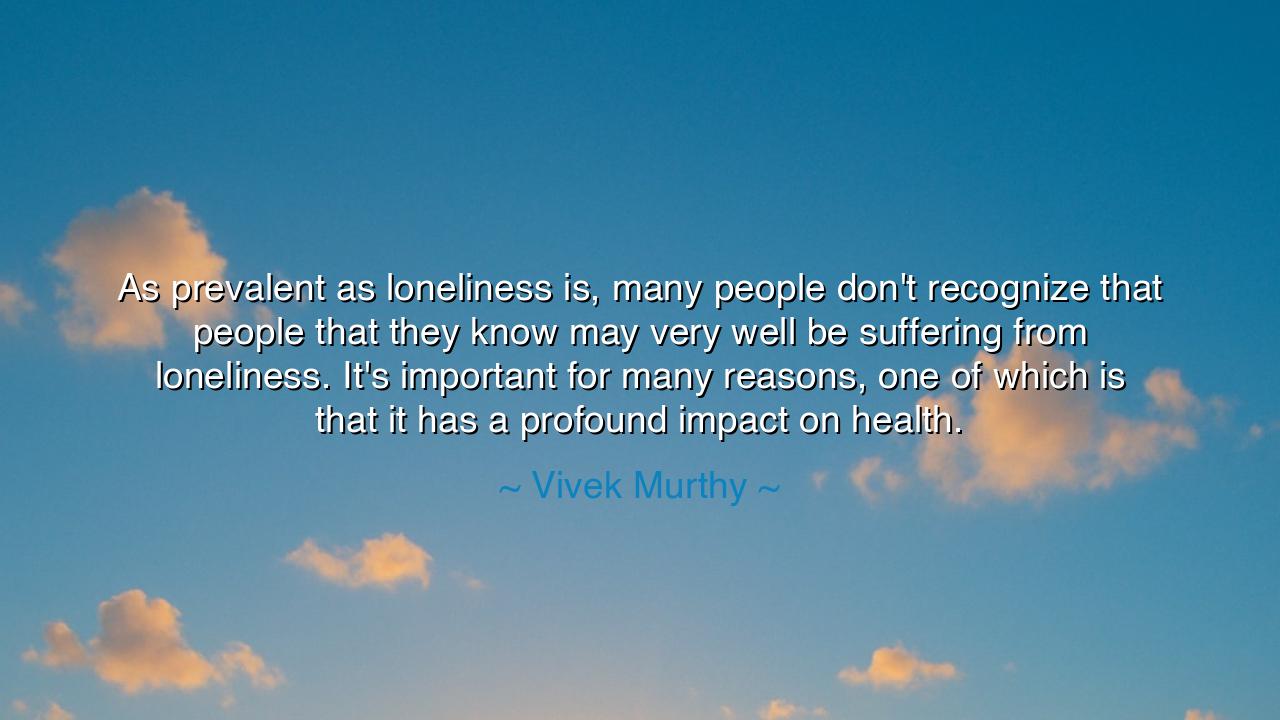
As prevalent as loneliness is, many people don't recognize that
As prevalent as loneliness is, many people don't recognize that people that they know may very well be suffering from loneliness. It's important for many reasons, one of which is that it has a profound impact on health.






The healer and thinker Vivek Murthy, physician of both body and spirit, once declared: “As prevalent as loneliness is, many people don’t recognize that people they know may very well be suffering from loneliness. It’s important for many reasons, one of which is that it has a profound impact on health.” In these words, he names one of the great unseen plagues of the modern age. For while the world grows more connected by wires and screens, the human heart grows more isolated. In ancient times, the wise understood that man was not born to live alone—that the spirit, deprived of companionship, begins to wither as surely as a plant deprived of light. Murthy’s insight rekindles that ancient wisdom: to be healthy in body, one must also be nourished in love, in belonging, in community.
In the old world, philosophers such as Aristotle called human beings “social animals.” They knew that the soul finds its purpose in relationship—in the gaze of a friend, the embrace of family, the shared burdens of life. Yet today, though cities are crowded and voices are many, true connection has become scarce. Loneliness, as Murthy tells us, hides in plain sight. It wears the mask of busyness, of laughter, of success. The one who seems surrounded by friends may still feel unseen. And because we have forgotten how to look beyond appearances, we pass by the lonely as though they were invisible. But their hearts ache silently, and their bodies too begin to bear the cost—for loneliness is not merely sorrow of the spirit; it is a wound that seeps into the flesh.
Murthy’s wisdom arises not only from reflection, but from his calling as a physician and a U.S. Surgeon General. He witnessed firsthand that loneliness—though intangible—can wound as deeply as any physical disease. It raises the risk of heart ailments, weakens the immune system, and shortens the span of life. Modern science now confirms what the ancients already knew: that the mind and body are one, and when the soul suffers, the body follows. To live without connection is to live without the lifeblood of purpose. Thus, his warning is not only a medical truth, but a moral one. He calls upon us to awaken—to notice, to reach out, to restore the bonds that sustain human life.
Consider the story of Mother Teresa, who served the poor and dying in the streets of Calcutta. She once said, “The greatest disease in the West today is not tuberculosis or leprosy; it is being unwanted, unloved, uncared for.” She saw that loneliness—the feeling of being forgotten—was more deadly than hunger. Her work was not merely to feed the body, but to remind each person that they were seen, known, and loved. And in that act of recognition, healing began. Her life stands as a testament to Murthy’s truth: that compassion is medicine, that kindness can be as vital as oxygen, and that every heart yearns not only for survival, but for connection.
In Murthy’s words, there is also a quiet rebuke to our modern indifference. We have built towers of wealth and temples of progress, but in doing so, we have neglected the sacred art of seeing one another. We treat loneliness as a private weakness rather than a collective wound. Yet no civilization can remain healthy while its people live in isolation. The ancients built marketplaces and public squares not merely to trade goods, but to trade fellowship. Today, we must rebuild those sacred spaces—not only with stone, but with presence. Every greeting, every listening ear, every genuine moment of care is an act of restoration.
The lesson, then, is clear: see the unseen. Look upon your friends, your neighbors, even the stranger, and remember that beneath every smile there may be a hidden ache. Speak gently; ask sincerely; offer your time. Do not underestimate the power of your presence, for in your attention may lie another’s healing. And do not neglect your own need for connection—seek community, seek conversation, seek the company of those who uplift your soul. In tending to one another, we preserve not only our hearts but our health, for the two are bound together by threads invisible but unbreakable.
So remember, O child of the modern age, the wisdom of Vivek Murthy: loneliness is not a weakness to be shamed, but a signal to be answered. It is the body’s cry for love, the spirit’s plea for belonging. Heal it not with medicine alone, but with humanity—with empathy, with listening, with care. For when we learn again to see one another truly, to connect beyond words and appearances, we do more than cure disease—we restore the soul of the world. And in that restoration, both heart and body find their strength once more.






AAdministratorAdministrator
Welcome, honored guests. Please leave a comment, we will respond soon